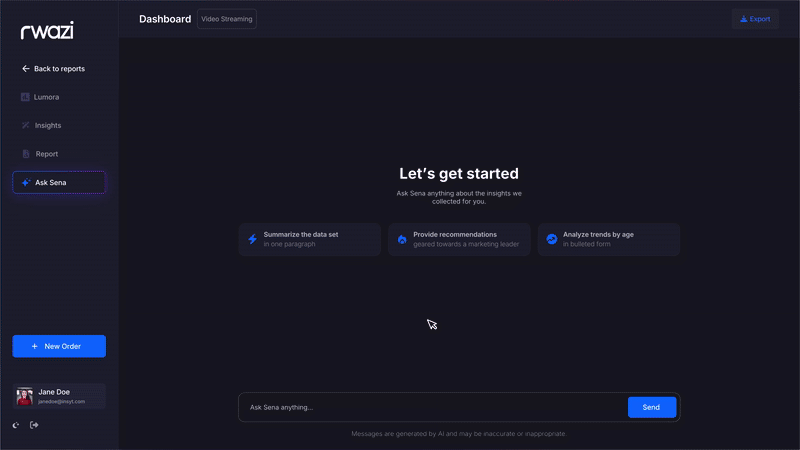
Welcome to Market Mosaic, where, in this week's edition, we dig into China's commanding 25-city robotaxi leadership versus America's 5-city presence and explore how tax arbitrage from 0% to 40% rates is challenging global consumer pricing.
We also analyse why 70% of US brands are having a tough time in international appeal amid rising geopolitical tensions.
Also, register to join us this Thursday for our Market Mosaic webinar here on “how AI and market feedback drive product innovation.”
Let’s now dive into the insights and stories.
— Insights Team, Rwazi
In our edition this week:
Sector Performance Tracker
Technology
Economy
Consumer Universe
Supply Chain

This weekly global market performance was analysed by Rwazi Insights
|
TECHNOLOGY Who leads the autonomous future of cars as consumer acceptance accelerates |

Data visualisation by Rwazi Insights
Our data analysis shows that China has emerged as the undisputed leader in robotaxi development and deployment, with companies like Apollo, WeRide, and Pony.ai operating across 25+ major cities compared to Waymo's 5-city presence in the US.
Consumer sentiment data shows remarkable acceptance of autonomous vehicles in Chinese markets, with 78% of urban consumers expressing willingness to use robotaxi services regularly. This contrasts with 52% acceptance rates in US markets, where safety concerns and regulatory hesitation continue to dampen enthusiasm.
The global expansion is evident with services now operational in Seoul and Abu Dhabi, indicating that autonomous transportation is becoming a consumer expectation rather than a novelty.
Key Insights
China's aggressive deployment strategy is creating a consumer base that expects autonomous transportation as a standard service, potentially giving Chinese companies a significant advantage in global markets where consumer familiarity breeds adoption.
|
ECONOMY Tax competition tntensifies as small businesses seek optimization |

Our comprehensive analysis of corporate tax burdens across 132 countries shows stark disparities that are increasingly influencing business location decisions and consumer pricing strategies.
The data shows that small businesses face different tax environments, from 0% in tax havens like the Bahamas, Bahrain, and UAE, to 40% in Guyana. China's competitive 5% rate has contributed to its manufacturing appeal, while traditional business hubs like the US (21%) and Germany (15.83%) maintain moderate positions.
Consumer impact analysis also indicates that businesses operating in high-tax jurisdictions are 34% more likely to pass costs to consumers through higher pricing. However, companies benefiting from low-tax environments show 23% greater price competitiveness in global markets.
Key Insights
Tax arbitrage is becoming a critical factor in consumer pricing dynamics, with businesses increasingly relocating operations to optimize tax burdens, ultimately affecting global product competitiveness and consumer choice.
|
CONSUMER UNIVERSE Anti-American sentiment erodes US brands' value globally |

A concerning trend has emerged in global consumer sentiment toward American brands, with 70% of US companies we analysed experiencing declining favorability ratings since January.
FedEx (-37%), WB/Discovery (-31%), and Coca-Cola (-28%) have experienced the steepest declines, while only McDonald's (+32%) and Meta (+11%) have maintained positive momentum. The "Buy Canadian" movement exemplifies this trend, with Canadian consumers actively boycotting US products in favour of domestic alternatives.
Regional analysis shows the most significant sentiment declines in Canada (-45%), Mexico (-38%), and several European markets (-25% average). Interestingly, Asian markets show more resilience, with only -12% average decline, suggesting geopolitical proximity amplifies consumer reactions.
Key Insights
Geopolitical tensions are increasingly translating into consumer purchasing decisions, requiring US brands to develop localization strategies and authentic community engagement to counteract nationality-based bias
|
SUPPLY CHAIN Mineral dependencies create consumer vulnerability |

Our analysis of the global supply chain for energy transition minerals shows dangerous concentration risks that threaten consumer access to clean technology products and potentially drive significant price volatility.
China's dominance is overwhelming: 100% of natural graphite processing, 90% of rare earth processing, and 74% of cobalt processing. This concentration creates consumer vulnerability, as disruptions could severely impact electric vehicle availability, smartphone production, and renewable energy installations.
Consumer price sensitivity analysis shows that supply chain disruptions in these minerals could increase end-product costs by 15-40%. For example, lithium supply constraints have already contributed to 23% higher EV battery costs in the past year, directly impacting consumer adoption rates.
Key Insights
Consumer access to clean technology products remains critically dependent on geographically concentrated supply chains, necessitating strategic diversification efforts to ensure stable pricing and availability of sustainable consumer goods.
|
WHAT IS HAPPENING AT RWAZI? |

Happening on Thursday, July 31: the Market Mosaic webinar series on LinkedIn Live
Join us this Thursday as we hold our Market Mosaic webinar on “Building with Data: How AI and market feedback drive product innovation.”
Alongside a high-level panel, this session will explore how today’s most forward-thinking companies can leverage AI and real-time consumer market data to inform product decisions, accelerate iteration, and drive growth across global markets.
Platform: LinkedIn Live
Date: Thursday, July 31, 2025
Time: 3 PM (GMT)

Meet our guest speaker: Anirudh Ramesh

Meet our guest speaker: Sophie Anjorin
|
MARKET MOSAIC PULSE CHECK |
Which factor most influences your purchasing decisions when choosing between similar products?

Meet Sena, your AI copilot for turning insight into execution.
After years of building the world's most comprehensive market intelligence platform and helping global enterprises understand "what's happening" and "what it means," we are now solving the final piece of the puzzle: "How do we act on this?"
Want to learn how Sena helps teams like yours execute strategic moves and explore market opportunities in real-time across functions?

Thank you for reading and joining us on Market Mosaic this week. We hope this edition provides valuable, actionable insights for decisions with data. 📊
|
ICYMI ON LINKEDIN |
Here are the insightful visuals we shared on LinkedIn. Feel free to check them out, comment or repost if it hits home for you.

The global consumer economy is experiencing its most dramatic restructuring in decades, and most businesses are completely unprepared for what's coming. …

Still marketing to the average consumer? Retail giants aren’t. Walmart. Amazon. Apple. Nestlé.…
